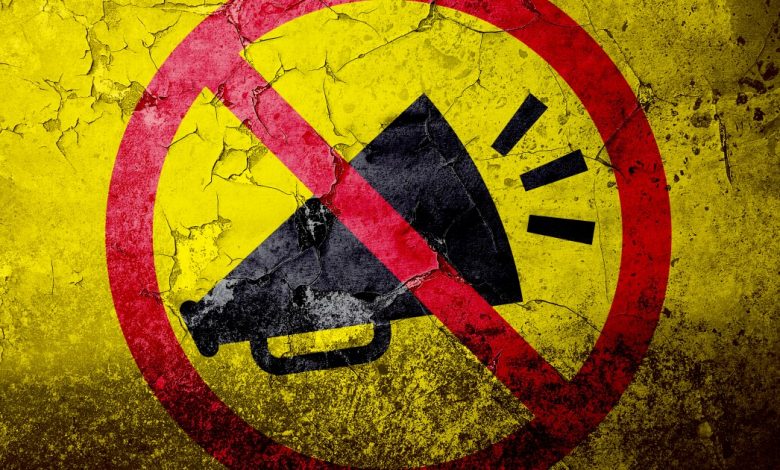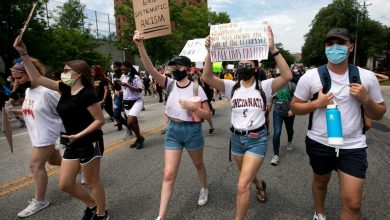College Students Are Losing Confidence in Their Free-Speech Rights

[ad_1]
Free expression remains highly valued among college students, but their confidence in that First Amendment right is declining — particularly among Republicans and Black and Hispanic students.
That’s according to a report on a new survey conducted by the Knight Foundation and the market-research firm Ipsos. The survey examines how partisanship, race, and ethnicity affect students’ views on free speech. It seeks to capture “the full spectrum of not only students’ opinions on policies, but some of what’s underneath that — some of the feelings and experiences they’ve had with speech in general, and on campus,” said Evette Alexander, director of the learning and impact division at the Knight Foundation.
A number of high-profile controversies involving speech restrictions on college campuses — most recently at the University of Florida, which made headlines for initially telling faculty members not to testify against the state as expert witnesses — have given rise to fears about restrictive speech environments in higher ed. Though college students across demographics see free speech as essential to American democracy, compared with those surveyed in years past, fewer of the 1,000 students surveyed in 2021 believe their right to free speech is secure, and fewer feel like the First Amendment protects people like them.
Our study shows that Black students, in particular, but also Hispanic students, don’t feel as protected by the First Amendment.
Only 47 percent of students surveyed in 2021 felt that their freedom of speech was secure, a significant drop from the 73 percent of students surveyed in 2016, the first time the survey was done, who felt secure in that freedom. The decline was particularly pronounced among Republicans, 27 percent whom felt that their free-speech rights were secure, compared with 61 percent of Democrats.
Black and Hispanic students felt secure in their right to free speech at similar rates as the overall number of students surveyed, but when asked whether the First Amendment protects people like them, they were more likely to say no.
“We’ve known for some time that students of color are more in favor of more policies to limit certain types of speech on campus, and are more interested in creating a safer campus environment when it comes to speech,” said Alexander. She said the survey highlights why that might be.
“Our study shows that Black students, in particular, but also Hispanic students, don’t feel as protected by the First Amendment,” says Alexander.
According to the latest survey, 90 percent of white students and 82 percent of Hispanic students believe that the First Amendment protects people like them. This is in stark contrast to the 51 percent of Black students who feel the same way, a considerable change from the 2019 survey results, when 60 percent of Black students felt the First Amendment protected people like them.
A significantly higher proportion of Black and Hispanic students also report feeling unsafe on campus because of others’ speech. About 20 percent of Black and Hispanic students have reported feeling unsafe on campus because of something someone said about their identities, whereas just 14 percent of white students have felt the same, underscoring the sense of inequality students of color feel about free expression and First Amendment protections.
“I think it should concern everyone that students of color don’t feel as protected by the First Amendment. The First Amendment is intended to protect all people, and in order for the United States to be a society that promotes free speech and free expression, we need everyone to feel that their speech is equally protected,” Alexander said.
Democrats are also more likely than Republicans and politically unaffiliated students to report feeling unsafe and uncomfortable on campus. Seventy-one percent of Republican students feel that the campus environment dampens free speech. Sixty-one percent of Democrats said the same.
A majority of college students continue to believe that it’s important for colleges to allow students to be exposed to all forms of speech, even if they find it offensive or biased. Where they draw the line is racist speech, according to the survey.
But still, some students — particularly Black and Hispanic students — prefer colleges to protect them by prohibiting speech they might perceive as offensive or biased. Thirty-six percent of Black students and 32 percent of Hispanic students favor speech protections on campus, compared with just 16 percent of white students, a trend that seems to be increasing over time. In 2019, only 28 percent of Black students and 19 percent of Hispanic students favored speech protections.
Alexander, of the Knight Foundation, notes that “a lot of what we have in terms of public opinion on speech on campus is at the aggregate level. That’s actually not helpful,” she says. The demographic breakdown of students’ opinions on the issue is more useful for those working in higher ed who want to respond to student concerns.
Ultimately, the publication of the survey aims to foster the idea that “understanding where different groups stand is important for higher-ed leaders as they seek to foster free expression on college campuses and create a campus environment that is diverse, equitable and inclusive,” according to the Knight-Ipsos report on the survey.
[ad_2]
Source link






